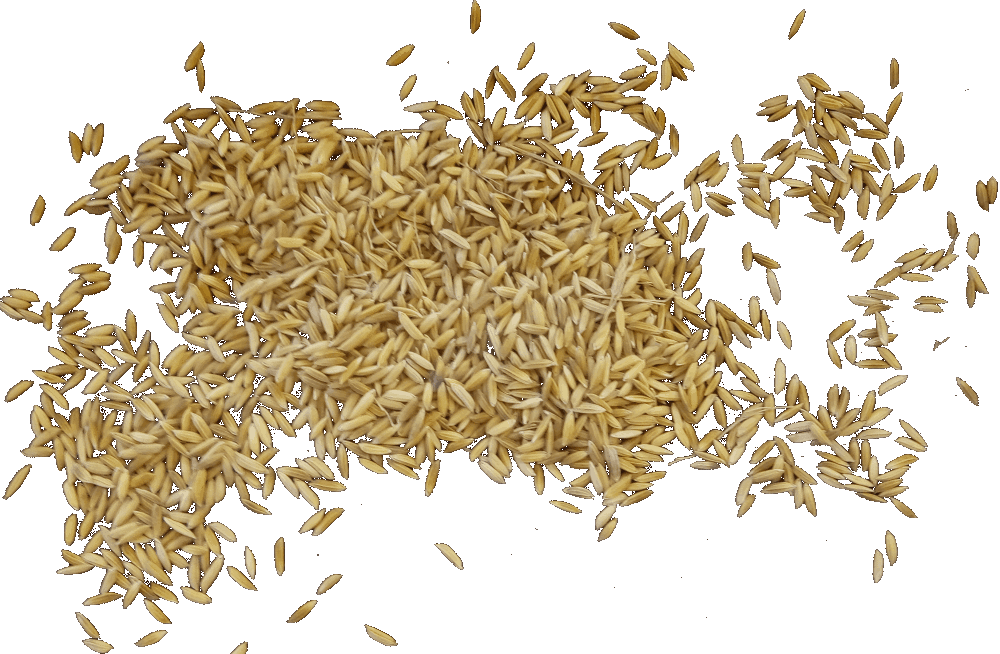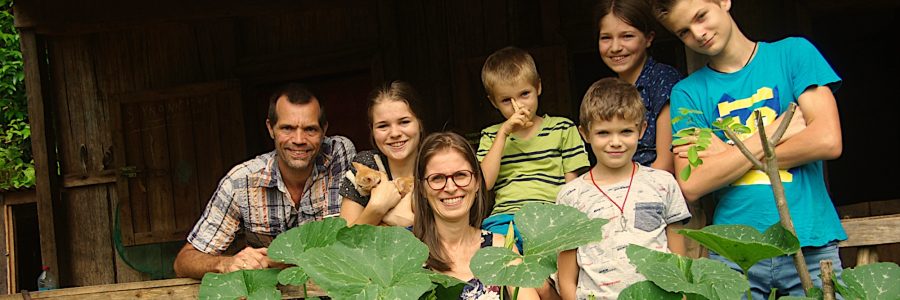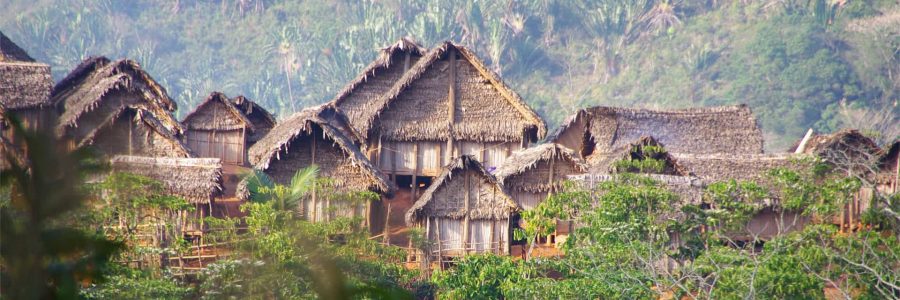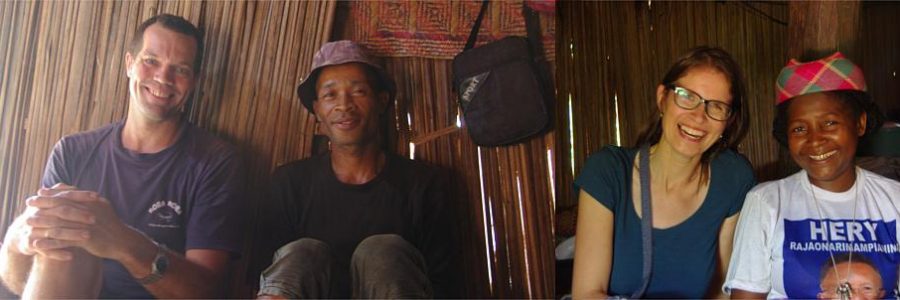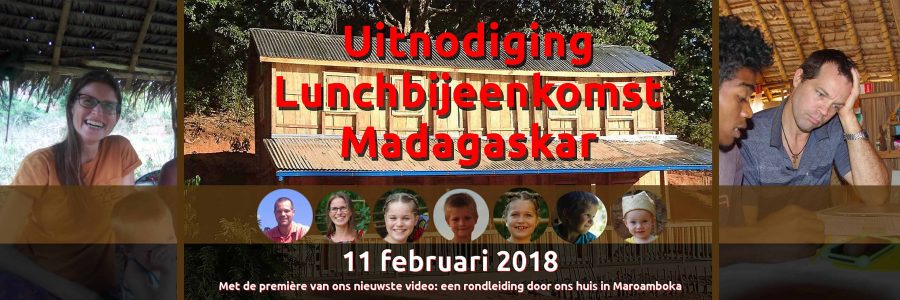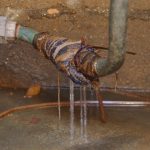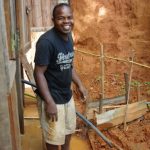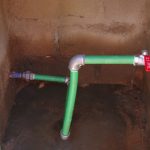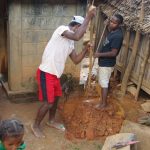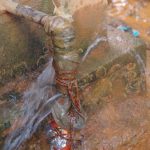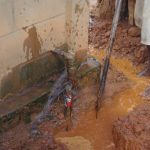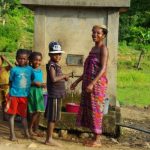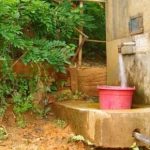Author: Jurgen & Katja
Mission
About Us
‘Ik ben op de smalle weg!’
Het is 3 januari en we genieten van de kerstvakantie. Het is lang geleden dat we als gezin Tsiombivohitra hebben bezocht en nu hebben we de tijd. Iaban’i en nendrin’i Melice, de koning van het dorp en zijn vrouw, weten dat we komen en hebben zich voorbereid: bij het vuur ligt al een gebonden kip klaar. ‘We blijven toch zeker eten?!’ Het is echt genieten bij hen: we krijgen allemaal—de kinderen ook—een kop koffie met suikerrietsap en we kletsen gezellig bij.
Tsiombivohitra is ‘ons eerste dorp’. Toen we hier in 2016 voor het eerst als gezin kwamen hebben we gevraagd of we als zendelingen bij hen welkom zouden zijn. We legden uit dat we ook vrienden nodig zouden hebben. Er volgde luid geroezemoes en daarbovenuit verklaarde nendrin’i Melice luid en duidelijk dat we vrienden zouden zijn. Ook toen al straalde ze: er was meteen een klik.
De mensen uit Tsiombivohitra hebben sindsdien veel geduld moeten hebben: na ons bezoek in september 2016 moest eerst ons huis gebouwd worden. In februari 2017 konden we erin. De eerste tijd waren we, behalve met het leren van het dialect en de plaatselijke cultuur, veel tijd kwijt met praktische probleem en leren hoe hier te leven. Het contact met Tsiombivohitra hielden we warm, maar van Bijbelverhalen vertellen kon nog geen sprake zijn, omdat de verhalen nog niet in het dialect waren vertaald. Tot ons eerste verlof in oktober 2017 was daarvoor 8 maanden de tijd.
In april 2018 waren we weer terug in ons huis in Maroamboka. Een van de eerste dingen die Jurgen oppakte was het contact met Tsiombivohitra. Vanaf mei vorig jaar ging Jurgen daar wekelijks heen om in het huis van de koning en zijn vrouw het evangelie te delen met wie maar horen wilde. Van meet af aan was met name nendrin’i Melice zeer geïnteresseerd. Haar man bevestigde de vriendschapsband door samen met Jurgen van hetzelfde bord te eten en uit dezelfde beker te drinken. Een andere keer zat de hut stampvol met dorpelingen.
Maar toen kwam eind juni: de koning en zijn vrouw waren niet thuis. In juli was er af en toe een enkeling die kwam luisteren, maar in augustus was het dorp leeg! We begrepen er niets van. Waar was iedereen? Het antwoord: naar de markt. Dat maakte het voor ons niet duidelijk. Naar de markt gaan is leuk, maar er was toch een afspraak? En Jurgen moest er 7 km heen en 7 km terug voor lopen in de brandende zon! We deelden onze frustraties met vrienden. Iedereen leek het de normaalste zaak van de wereld te vinden dat Tsiombivohitra leeg was op marktdag. Uiteindelijk werd ons duidelijk dat de markt vooral een sociale aangelegenheid is: daar moet je heen. We hebben ons dus maar bij de koffiemarkt neergelegd en het seizoen afgewacht. De koffie-oogst en de bijbehorende markt duurden nog tot eind november. Gelukkig ging het werk in andere dorpen ondertussen door.
Na 5 maanden pauze was het spannend de bezoeken aan Tsiombivohitra weer op te pakken: betekende hun keuze voor de markt desinteresse of was het puur een culturele aangelegenheid? Al snel werd duidelijk dat Jurgen—met Bijbelverhalen—nog steeds welkom was. De derde keer was het verhaal over de smalle en de brede weg aan de beurt, het moment in de verhalenreeks waarop mensen een keuze wordt voorgehouden. Nendrin’i Melice gaf daarop aan dat ze Jezus wilde volgen. Jurgen heeft toen uitgelegd dat het leven van een gelovige moeilijk is en dat het offers vraagt. Hij heeft haar aangeraden er goed over na te denken en gezegd wat ze zou kunnen bidden als ze door wilde zetten. De weken daarop heeft hij het verhaal herhaald, ook vanwege nieuwkomers.
Zo ook op 3 januari. Jurgen legt uit wat de 2 wegen zijn als nendrin’i Melice uitroept: ‘Ik ben op de smalle weg!’ Ze ziet zielsgelukkig en voegt later toe: ‘Ik ga naar de hemel!’
In een privégesprek vertelt de koning later dat hij en zijn vrouw nu geloven, maar dat het moeilijk is. Van een koning wordt veel verwacht en daar komt bij dat hij de jongste is van 2 koningen in het dorp. De oudere koning—tevens toverdokter—moet worden gerespecteerd. Ze beginnen nu al te ervaren dat geloven wandelen op een smalle weg is, maar het geluk is te lezen in hun ogen. Een mooier Kerstcadeau hadden we ons niet kunnen wensen dan die ochtend in Tsiombivohitra te zijn.
Facebook Fundraising for Our Car
NB:. This Fundraiser has finished with a good result!
For those who do not know us: We are Jurgen and katja Hofmann and together with our five children we live in Maroamboka, Madagascar. Maroamboka is a remote rural village situated in the south-east of Madagascar in the middle of the Antanala area. The Antanala have to live and work under very harsh circumstances. They have to work hard for as little as 0,75 Euros a day. Especially after the cyclone season the area is very hard to reach by road.
It is our passion to tell the good news of Jesus Christ to those who have never heard; to give them the chance to believe and be saved. Besides sharing the Gospel we try to help people improve their circumstances. Last year we did this by repairing, together with the locals, all water pumps in and around Maroamboka. We also help people to become aware of the importance of good hygiene. Finally we hope to be of assistance in improving the overall situation in which the people need to live.
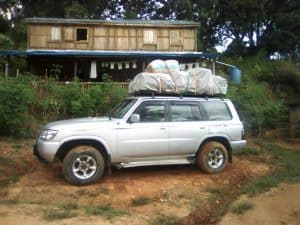 The roads are extremely bad and even though we have a sturdy 4×4 it is not always possible to come in or out of the area. After living in Maroamboka for a year we have to the conclusion that our car needs some modifications. These modifications will help us greatly to travel in and out the area more easily and, not unimportant, more safely.
The roads are extremely bad and even though we have a sturdy 4×4 it is not always possible to come in or out of the area. After living in Maroamboka for a year we have to the conclusion that our car needs some modifications. These modifications will help us greatly to travel in and out the area more easily and, not unimportant, more safely.
These modifications are costly. Overall all modifications on 4x4s are expensive on Madagascar. This is the reason we started this Fundraising on Facebook.
We truly hope that we can raise enough money this way. It will help the Antanala people greatly!
A Tour In And Around Our House
On the 11th of February we are organising a meeting in which we will give a presentation of our work on Madagascar. No worries, we fully understand that you might have others things to do than travelling up to Holland for this occasion.
However, there is one thing you can do to get a glimpse of our lives on
Madagascar! You can watch the tour in and around our house given by Katja and the children. In an 18 minutes video they will show you every corner of our house and there playground.
For now we give you a little teaser but stay tuned as on the 11th of February this video will go live!
TRAILER: A Tour In And Around Our House in Maroamboka
From Frustration to Fruitfulness
August 2017
It was Friday the 9th of June in the afternoon that we said to each other: ‘What a relief that we could bring Anna (a visiting co-worker) to the bus station this morning. Surely we cannot leave the area any time soon after all this rain. Let’s hope nothing happens.’ That night Jurgen woke up with a terrible pain in his stomach and back. When he also started to show symptoms of bowel obstruction we were truly alarmed and decided to ask for an evacuation. At the beginning of the afternoon on Saturday a helicopter took Jurgen to a hospital in the capital.
Half a week later Jurgen was released from hospital after minor surgery. A large kidney stone was removed from his urinary tract and later that week he passed a smaller one naturally. A friend took him in and, after regaining some strength, Jurgen came back home after two weeks. We were all still very impressed with what had happened, but a week or two later Jurgen was his usual self again: ready for work!
However, for the translation of the Bible stories, Jurgen is dependent on Menja, the local school teacher. He speaks both official Malagasy and the Tanala dialect. He translates the stories from Malagasy to Tanala, after which Jurgen and he go through each and every story in detail checking the content against the Bible and making sure the stories are easy to understand. When Jurgen was well again Menja was very busy finishing the school year, and after that he became ill for weeks.
Halfway through July we had only one week left before having to return to the capital for supplies and paperwork. We were somewhat discouraged and felt we had accomplished little. We noticed that our friend Menja, although recovered from sickness, also seemed gloomy. He told us he was not able to visit his family for lack of money as he had not been payed his wages for seven months!
We suggested Menja we would pay him for every Bible story he translated. He did not agree: he liked helping and between friends no wages should be payed. ‘How would you feel about a gift for every story you complete?’ we asked. His face broke into a smile. We soon agreed on the size of the gift and half a week later he had completed the whole first set: we now have 40 stories to work on! Unexpectedly we left our village quite content, and Menja was able to leave the next day to visit his parents.
How to solve this?
30 May 2017
Several months have past since we moved to the place of our ministry: Maroamboka. We are blessed with a nice house and enough space for the children to play and to be schooled and to withdraw from daily busyness as a family.
The house is constructed mainly with wood from the nearby forests. We have a tin roof and the downstairs floor is made of concrete. We had already bought a solar-panelsystem in Tana so we even have lights during the evenings and electricity to recharge our phones and laptops. We also have a 500 litre water reservoir next to the house. This sounds like a lot but it will surprise you how much water a family of seven needs during the day. Officially we would have running water in the house. The builders connected water-pipes to the pump only 10 metres from the house. Officially? Yes, we know, that needs some explanation.
It was in the middle of the rainy season when we moved here… Only, there was no rain yet. Our water reservoir was empty and the pump was not working. We had to walk, with our jerrycans, to the nearest pump in the village only to discover that all but one stopped working. The only working pump was at the same time the one that was furthest away and not giving water on a regular base. If it gave water it was really slowww. As a consequence Jurgen had to put al the jerrycans in the car and drive to get water elsewhere. Easier said then done. To get to good water he had to drive about 5 kilometres, walk through several rice fields and climb high rocks. There he could get water from a spring. Needless to say that walking and climbing with a 20 litre jerrycan is tiresome and dangerous. Doing this will quickly help you to discover how much water you use during a day.
It was no fun for Katja and the children that Jurgen had to go to Tana for a week to get the car papers. Everybody was under strict rules concerning the use of water. Katja asked a local boy to fetch water. She payed him the same wage as water-fetchers in Tana receive. This money is a good salary in this region. The boy was motivated at first but soon he lost his motivation and he simple did not come anymore. Katja and the children needed to fetch the water themselves again. New rules: use the bare minimum during the dishes; wash yourself with maximum two measures of water; the toilet is only to be flushed by mommy or daddy and only with wastewater and so on and so forth… No fun at all!
When Jurgen came back he brought the showers with him. Torrents of rain fell down and the water reservoir filled up quickly. A brief moment without worries but what to do when the rains go away, going through the pain of hauling water again?
We started to ask about the problem left and right. Everybody in the village seemed to have his or her own truth concerning the problems of the pumps. We told the people that a village of this size (about 500 people) needed clean water to stay healthy. Yes, everybody agreed on this. We asked what they would do if the last pump broke down as well. We where astonished at their answer: “We will fetch our water from the river or get it from another village.” The water in the river is filthy, to say at least. Everywhere people dump there filth in the water and we don’t even want to start about the parasites.
Our contact person, Sylvestre, arrived back from Tana that week. He knew about the problem and told us about all the issues. It would cost quite some money to repair it. We where talking about 500.000 Ariary (give or take 150 Euro). This is a lot of money for the locals but it is doable for us.
The easiest way would be to give that money and tell Sylvestre to fix the problem. However, this is not wise as the responsibility is not ours alone. Furthermore, paying everything ourselves would establish the idea that the vazaha (white foreigner) will pay whatever problem comes up. No, we had the deal wisely with this issue. We proposed that we would pay for the materials and the villagers had to pay the plumber. We had to do this through the official channel, through the President of the Fokantany (a sort of mayor of a bigger district). Sylvestre went to talk with him, in our name. The President liked the idea and next day he arranged a big meeting in the village. Jurgen had to attend the meeting and was expected to stand next to the president.
The president clearly took the lead in the meeting! How was it possible that this problem persisted so long already? And why is it that the vazaha recognised the problem and came to him? Yes, why is it that the vazaha was more worried about the peoples health then the people themselves? Amazing that the vazaha asked questios about the problem and that knowone gave him a good answer! The president continued like this for 20 minutes, all the time Jurgen in the middle of it feeling smaller and smaller.
When the president finished his speech he told the people about our solution of paying for the materials. Big applause… But! He continued, you have to pay the plumber as it is not only the responsibility of the vazaha. But since the president expected that the people would not pay enough to fulfill their part of the agreement he came with a simple solution: A tax system of 200 Ariary (0,06 Euro-cents) per month, per family would do. The villagers agreed and that settled it.
Finally, the presidents asked Jurgen to say a few words. Jurgen explained again how important clean water is and how easy it is to get sick without. Also, one pump is clearly not enough for the whole village. Again, applause. Now the president asked Jurgen to leave as he wanted to finish the meeting.
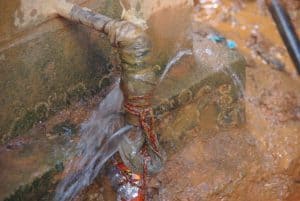 It is three months later at the moment of writing. Our contact person had to be in Tana and there he bought all the material needed for the work. And yes! In the weekend of 20/21 May we saw the plumber cycling down the road into the village. All the material was there and he started his work. To our surprise he started in the higher part of the village, located on a mountain and called Maroamboka-ambony (Maroamboka-up). We did not know that their pumps where failing as well. Systematically the plumber worked his way down. It is interesting to see how they work here. In Holland the plumbers just close the main pipe and they work with now water pressure on the pipes. A main valve is nowhere to be found here so they have to work with the water pressure on… nice and fresh in this climate!
It is three months later at the moment of writing. Our contact person had to be in Tana and there he bought all the material needed for the work. And yes! In the weekend of 20/21 May we saw the plumber cycling down the road into the village. All the material was there and he started his work. To our surprise he started in the higher part of the village, located on a mountain and called Maroamboka-ambony (Maroamboka-up). We did not know that their pumps where failing as well. Systematically the plumber worked his way down. It is interesting to see how they work here. In Holland the plumbers just close the main pipe and they work with now water pressure on the pipes. A main valve is nowhere to be found here so they have to work with the water pressure on… nice and fresh in this climate!
Meanwhile we are enjoying the water for a week already. It is nice and calm in the house as we do not have to wrestle with the jerrycans anymore. On top of that, we can use a little more water without worrying all the time. Enough water to wash, to shower and even to flush the toilet gives us more time to spend on other things. People in the village are happy as well. Everybody has a working pump near the house now. It is lovely to hear the happy noises, in the mornings and evenings; noises of people chatting while they wait their turn to was themselves or to wash their clothes. We are so happy that this problem could be solved! As said, it give us much more time to do other things. God is good!
Visit and Presents
24 May 2017
It was a surprise to hear from AIM-Netherlands that they were planning a visit to us. Gerla van Zandwijk served the Lord on Madagascar for five years so she was the one to come. She would have the opportunity to visit old friends as well.
After some mailing back and forth we decided that Jurgen would fetch Gerla from Tana, the capital of Madagascar. We planned the trip thoroughly as Antananarivo is to far not to do anything whilst there. First of all we needed fresh vegetables! Tana has got plenty of it. Further, more wood to fix new and old problems in and around the house. Then, the car needed a check and so did Jurgen. Jurgen was walking around with several infections for two months al ready. All in all, the trip to Tana would be well spend.
But, first things first! Gerla decided to visit our home church in Holland. Our home-front committee did not want to let this visit go to waste and they informed everyone about Gerla’s visit. It would be an opportunity to give something nice to the Hofmanns far away. Well, that was spot on! Gerla received all kinds of presents to bring along. Together with the few things she would al ready bring, she had to bring around 25 kilo of nice surprises to Madagascar. Some informed her that they were willing to pay any overweight. But God is good, the lady at the airport understood the situation, and after some work behind the computer, Gerla was allowed to check in her overweighted luggage without paying anything extra.
Jurgen and Gerla met each-other in Tana and planned the trip to Maroamboka on the 16th of May. However, they had to postpone the trip as the rear-left drumbrake of the car needed some work and two things are very important on Madagascar: Good and strong brakes and a loud klaxon. On the 17th the left at 3:30 AM in order to arrive in Maroamboka the same day at 5 PM.
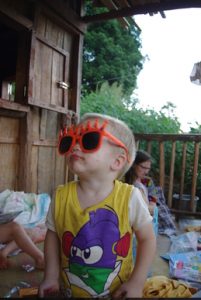 For some reason children always seem to detect odd things hidden away in cars. Somewhere between the boxes stood a big bag full of presents. Next day the atmosphere could best be described as that of a child waiting for the presents on Christmas or his/her birthday. How exciting to finally unwrap everything! Chocolate, felt pens, candy, letters, toys special Dutch orange sunglasses and t-shirts and so on and so forth. Where to begin? First chocolate or first playing with the newly gained toys? Maybe both at the same time! It was a big happening, what a feast.
For some reason children always seem to detect odd things hidden away in cars. Somewhere between the boxes stood a big bag full of presents. Next day the atmosphere could best be described as that of a child waiting for the presents on Christmas or his/her birthday. How exciting to finally unwrap everything! Chocolate, felt pens, candy, letters, toys special Dutch orange sunglasses and t-shirts and so on and so forth. Where to begin? First chocolate or first playing with the newly gained toys? Maybe both at the same time! It was a big happening, what a feast.
We introduced Gerla in the village. It was good to see the interaction between her and the people. Hardly a year ago people ran away into their house out of fear of the foreigners (us). Now, they came out of their houses to welcome Gerla. The fact that Gerla was still able to talk some Malagasy helped greatly. But, oh my! What is that white lady tall! Dadan’i Vanya (Jurgen) did tell them before but to see it themselves was something different. And wait a minute! She is not only tall but also strong. Gerla helped Jurgen to fetch water and she carried a 20 litre jerry-can full water back home.
Gerla went back to Tana on Sunday the 21st. No, that was way to short according to the people. Did she not like it here? That question was asked several times. No, that was not it, could we assure them. It is just that Gerla has so many friends on Madagascar that she is very busy to meet them all. Well, was the conclusion of the people, then this cannot be regarded as a holiday for her.
While writing this article Gerla arrived safely back in Antananarivo and has still some visits to pay. We have been spoiled with her visit and all the presents and attention from the people back home. It feels good to notice that we are not alone in this mission. We are working together to see Gods Kingdom grow!
Seven Weeks Maroamboka
At the time of writing we have arrived back in our new house a week ago from a trip to the capital. So we have started our ‘second term’ here. How did it go since the move in February? We share our ups and downs with you.
Circus Hofmann
Some of our new neighbours had never seen white people before we came, so there are children who are very afraid of us. But most found our every move most interesting. For the first three weeks there seemed to be a youth gathering right outside our house. When we went for a walk we were followed. Words uttered were repeated with many giggles. Mothers bragged to other mothers that their child was not afraid of the ‘vazaha’ (white foreigners), proving their statement by bringing their – sometimes screaming – child up close. By now most villagers are somewhat used to our appearance and we feel less like circus artists.
New Friends
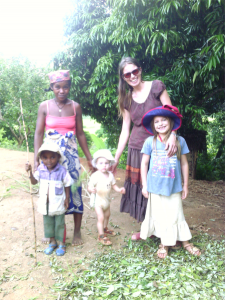 Friends and good neighbours help make a house a home, and that certainly goes for us here. We already knew Sylvestre, our first contact here who allowed AIM to build us a house on a plot of his land. We regularly share a meal. We have also become acquainted with the president of the fokontany, a high local government official, and his wife.
Friends and good neighbours help make a house a home, and that certainly goes for us here. We already knew Sylvestre, our first contact here who allowed AIM to build us a house on a plot of his land. We regularly share a meal. We have also become acquainted with the president of the fokontany, a high local government official, and his wife.
A great blessing is the friendship with maman’i Prisca, who welcomed us from the beginning. She even gave us a life chicken, a traditional but costly welcome present. We see each other most every day.
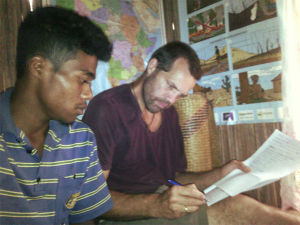 Then there is Menja, the local teacher, who has agreed to help Jurgen translate Bible stories into Tanala. They have already visited a remote village together.
Then there is Menja, the local teacher, who has agreed to help Jurgen translate Bible stories into Tanala. They have already visited a remote village together.
New Foes
Or challenges at least. We had fervently hoped for running water in the house. The pump is there, the pipes are there, and the taps – but the water… As we understand the main pipe leading from the upper village to the lower villages had breaks or leaks, and nobody knows exactly where. Then the pumps that do work leak badly so there is no pressure left to make our pump work. We are working on a solution, but things go slowly on Madagascar. So we rejoice in rain and fill up as many jerry-cans as we can to avoid having to walk to the faraway pump all too often.
Water can be a friend, but a foe as well. In March a cyclone hit our area, causing flooding and land washes. We discovered our ark-like mansion is not so waterproof… Jurgen has already spent many hours fixing leaks. So long as the rain comes straight down we stay dry, but at an angle… The road was already bad, but has got worse since the cyclone. Travelling by night is no longer an option in our area, and we had to buy mud tires for the car. They have already helped us out of a ditch twice on our last trip!
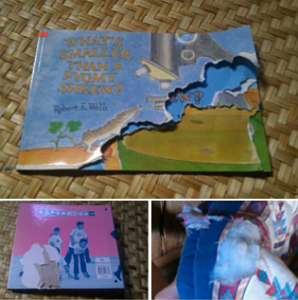 Then the rats. When we asked our friend maman’i Prisca whether she had rats in her house she said “Yes, in the roof.” Did that not bother her and keep her from sleep? “Oh well, we Malagasy sleep together with animals.” is what she replied. We honestly have a little trouble there. So far the rats have put their teeth in our food, soap, bedding, pillow covers, clothing, schoolbooks, toys, and wood. We are not amused. We gave Vanya a kitten, but she is still somewhat young to be on the job. In the meantime Jurgen is making us a ratproof cupboard for storing our fresh foods. No more rats on our tomatoes!
Then the rats. When we asked our friend maman’i Prisca whether she had rats in her house she said “Yes, in the roof.” Did that not bother her and keep her from sleep? “Oh well, we Malagasy sleep together with animals.” is what she replied. We honestly have a little trouble there. So far the rats have put their teeth in our food, soap, bedding, pillow covers, clothing, schoolbooks, toys, and wood. We are not amused. We gave Vanya a kitten, but she is still somewhat young to be on the job. In the meantime Jurgen is making us a ratproof cupboard for storing our fresh foods. No more rats on our tomatoes!
Elaborate Greetings
The Tanala take pride in their elaborate greetings. When meeting, one should inquire about how the other person has fared before, ask for news and express joy over seeing each other again. The longer the time lapse between meeting, the longer the greeting. We have not quite worked out all the greetings, but we can follow the general patterns. When walking through our village, the villagers love to test us and see if we give the correct responses.
Far Away But In the Right Place
Of course, we already knew we were far away from Holland. However, being at the end of a mud road, living off-grid, having no internet to speak of and missing the postman on his rounds (where is that man?) makes us even more aware of the distance. At times, we have felt isolated and down, but over all we recognise Gods hand in our being here. He planned it and prepared it. He wants us here. He loves the Tanala. We are learning to love them too – and so far that is not so hard.
